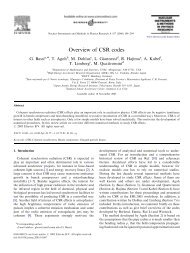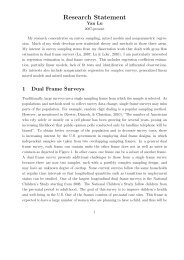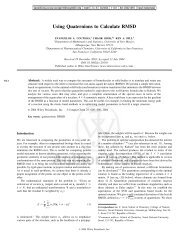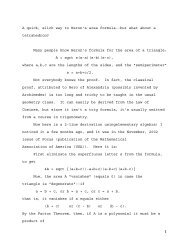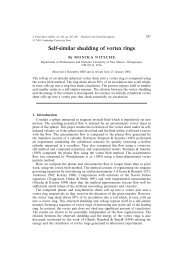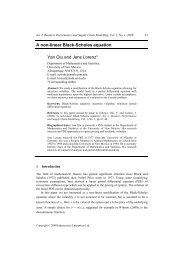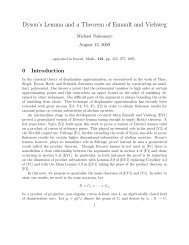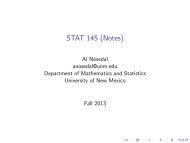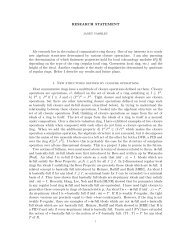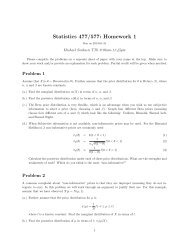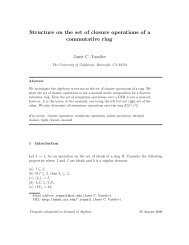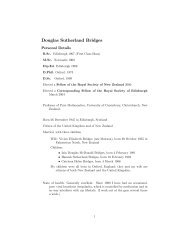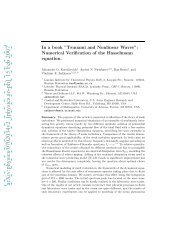OEO Office of Equal Opportunity - Department of Mathematics and ...
OEO Office of Equal Opportunity - Department of Mathematics and ...
OEO Office of Equal Opportunity - Department of Mathematics and ...
You also want an ePaper? Increase the reach of your titles
YUMPU automatically turns print PDFs into web optimized ePapers that Google loves.
288 ARTS AND SCIENCES<br />
150. Introduction to Latin America. (3)<br />
(Also <strong>of</strong>fered as POLS 150.) An interdisciplinary introduction<br />
to the geography, culture, literature, society, politics, history<br />
<strong>and</strong> international relations <strong>of</strong> the region. A two-hour lecture<br />
by faculty members from different departments will be followed<br />
by a one-hour discussion section each week. {Offered<br />
upon dem<strong>and</strong>}<br />
200. Foundations <strong>of</strong> Social Welfare. (3) Coughlin<br />
Historical development <strong>of</strong> social welfare institutions <strong>and</strong> the<br />
welfare state; social indicators <strong>and</strong> the quality <strong>of</strong> life.<br />
Prerequisite: 101. {Fall, Spring}<br />
205. Crime, Public Policy <strong>and</strong> the Criminal Justice<br />
System. (3) Broidy<br />
The study <strong>of</strong> crime, the criminal justice system <strong>and</strong> crimerelated<br />
public policy. Discussion <strong>of</strong> key criminological concepts,<br />
measurement <strong>of</strong> crime <strong>and</strong> delinquency, its distribution<br />
in society, victimization, public opinion, the criminal justice<br />
system, crime control strategies <strong>and</strong> policies.<br />
Prerequisite: 101.<br />
211. Social Problems. (3) Coughlin, Schrank<br />
Description <strong>and</strong> analysis <strong>of</strong> major social problems facing<br />
American society. Foci may include: poverty, homelessness,<br />
alcohol <strong>and</strong> drug problems, race <strong>and</strong> ethnic relations, aging<br />
<strong>and</strong> mental illness.<br />
Prerequisite: 101. {Fall, Spring}<br />
213. Deviance. (3) Broidy, Tiano, Wadsworth<br />
Survey <strong>of</strong> major forms <strong>of</strong> norm-violating behavior in American<br />
society, such as drug <strong>and</strong> alcohol abuse, mental illness, criminal<br />
behavior <strong>and</strong> sexual deviance. Discussion <strong>of</strong> sociological<br />
explanations <strong>of</strong> the causes <strong>of</strong>, <strong>and</strong> attempts to address,<br />
these behaviors.<br />
Prerequisite: 101. {Fall, Spring}<br />
216. The Dynamics <strong>of</strong> Prejudice. (3) Gonzales, Lopez<br />
The study <strong>of</strong> prejudice <strong>and</strong> discrimination, including their<br />
historical <strong>and</strong> contemporary sources <strong>and</strong> prospects for their<br />
reduction, with applications to American institutions.<br />
Prerequisite: 101. {Fall, Spring}<br />
221. Global Issues. (3) Tiano, Schrank, Valdés<br />
The global context <strong>of</strong> patterns <strong>of</strong> development in nationstates<br />
with an emphasis on industrializing countries. Selected<br />
topics <strong>of</strong> social, economic <strong>and</strong> cultural change. Inequality,<br />
war, reform <strong>and</strong> revolution in global perspective. Meets New<br />
Mexico Lower Division General Education Common Core<br />
Curriculum Area IV: Social/Behavioral Sciences.<br />
Prerequisite: 101. {Fall, Spring}<br />
225. Marriage, Family <strong>and</strong> Their Alternatives. (3) Hood<br />
Comparative analysis <strong>of</strong> contemporary family <strong>and</strong> household<br />
forms such as dual-worker, single-parent <strong>and</strong> homosexual<br />
couple households. Focus on links between large-scale<br />
social changes <strong>and</strong> changing family composition <strong>and</strong> interaction<br />
patterns. Meets New Mexico Lower Division General<br />
Education Common Core Curriculum Area IV: Social/<br />
Behavioral Sciences (NMCCN 2213).<br />
Prerequisite: 101. {Spring}<br />
230. Society <strong>and</strong> Personality. (3)<br />
The social psychology <strong>of</strong> personalities, relationships, small<br />
groups <strong>and</strong> organizations.<br />
Prerequisite: 101. {Offered upon dem<strong>and</strong>}<br />
250. Latin America Through Film. (3) Valdes<br />
(Also <strong>of</strong>fered as POLS 250.) Interdisciplinary introduction to<br />
Latin American studies through documentary films, lectures,<br />
reading <strong>and</strong> discussion.<br />
Prerequisite: 101. {Offered upon dem<strong>and</strong>}<br />
280. Introduction to Research Methods. (3) Hood,<br />
Roberts, St. George<br />
A survey <strong>of</strong> the major methods <strong>of</strong> social research: foundations<br />
<strong>of</strong> social research, research design, sampling <strong>and</strong><br />
measurement, quantitative <strong>and</strong> qualitative research methods<br />
<strong>and</strong> data analysis.<br />
Prerequisite: 101. {Fall, Spring}<br />
300. Social Welfare: Policies <strong>and</strong> Programs. (3) Coughlin<br />
Examination <strong>of</strong> the American social welfare system at federal,<br />
state <strong>and</strong> local levels; the social programs <strong>of</strong> developed <strong>and</strong><br />
developing societies.<br />
Prerequisite: 200. {Fall}<br />
303. Sociology <strong>of</strong> Political Behavior. (3) Coughlin, Fiala<br />
Examination <strong>of</strong> the social bases <strong>of</strong> political behavior. Major<br />
topics include the character <strong>and</strong> expansion <strong>of</strong> the state, the<br />
social bases <strong>of</strong> various forms <strong>of</strong> political rule <strong>and</strong> political<br />
change in the contemporary world.<br />
Prerequisite: 101. {Offered upon dem<strong>and</strong>}<br />
305. Environmental Sociology. (3)<br />
Examination <strong>of</strong> humans <strong>and</strong> the environment from an ecological<br />
perspective. Focus on industrial <strong>and</strong> economic growth,<br />
natural resources development, environmental values <strong>and</strong><br />
movements, resource management, <strong>and</strong> comparative perspective<br />
on people’s relationship to the environment.<br />
Prerequisite: 101.<br />
308. Sociology <strong>of</strong> Gender. (3) Burris, Hood, Lopez<br />
(Also <strong>of</strong>fered as WMST 308.) How <strong>and</strong> why societies create<br />
gender categories. How do definitions <strong>of</strong> “masculinity” <strong>and</strong><br />
“femininity” vary? What are the costs <strong>and</strong> benefits <strong>of</strong> being<br />
male or female in contemporary American society?<br />
Prerequisite: 101. {Fall, Spring}<br />
310. Sociology <strong>of</strong> Aging <strong>and</strong> the Aged. (3)<br />
Descriptive <strong>and</strong> theoretical study <strong>of</strong> the social situation<br />
<strong>of</strong> older persons in contemporary industrial societies; the<br />
impact on societal institutions <strong>of</strong> an increasing percentage<br />
<strong>of</strong> older citizens.<br />
Prerequisite: 101. {Offered upon dem<strong>and</strong>}<br />
312. Causes <strong>of</strong> Crime <strong>and</strong> Delinquency. (3) Broidy,<br />
Wadsworth, Wood<br />
A survey <strong>of</strong> criminological theories exploring why some<br />
people are more likely to engage in crime than others <strong>and</strong><br />
why crime rates vary over time <strong>and</strong> space <strong>and</strong> across social<br />
groups. Attendant policy issues will also be discussed.<br />
Prerequisites: 205 <strong>and</strong> 213. {Fall, Spring}<br />
313. Social Control. (3) Broidy, Wadsworth, Wood<br />
The study <strong>of</strong> informal <strong>and</strong> formal social control strategies for<br />
guiding <strong>and</strong> monitoring individual behavior <strong>and</strong> social interaction.<br />
Discussion <strong>of</strong> key social control agents <strong>and</strong> institutions,<br />
including the family, schools, peers, media, religion <strong>and</strong> the<br />
criminal justice system.<br />
Prerequisites: 205 <strong>and</strong> 213. {Fall, Spring}<br />
321. Sociology <strong>of</strong> Medical Practice. (3)<br />
An introduction to the delivery <strong>of</strong> health care in the U.S. <strong>and</strong><br />
selected other countries is pursued with an emphasis on the<br />
interaction <strong>of</strong> patients, pr<strong>of</strong>essionals <strong>and</strong> health care institutions.<br />
{Offered upon dem<strong>and</strong>}<br />
322. Social Epidemiology. (3)<br />
Examines the influence <strong>of</strong> social variables on human’s health,<br />
illness <strong>and</strong> death. The complex role <strong>of</strong> lifestyle, socioeconomic<br />
status, marriage, occupation, culture <strong>and</strong> other variables<br />
are examined as they are related to survival.<br />
Prerequisite: 101. {Offered upon dem<strong>and</strong>}<br />
326. Sociology <strong>of</strong> New Mexico. (3) Valdés<br />
New Mexico as a social system; the infrastructure <strong>of</strong> communities<br />
<strong>and</strong> ethnic groups, stratification, major social institutions,<br />
deviance <strong>and</strong> inter-group relations.<br />
Prerequisite: 101. {Fall}<br />
331. Collective Behavior. (3) Gonzales<br />
The study <strong>of</strong> riots, disturbances, social movements <strong>and</strong> other<br />
forms <strong>of</strong> contentious collective behavior. Strategies <strong>of</strong> conflict<br />
<strong>and</strong> conflict resolution are considered.<br />
Prerequisite: 101. {Offered upon dem<strong>and</strong>}<br />
335. Sociology <strong>of</strong> Mass Communication. (3)<br />
(Also <strong>of</strong>fered as CJ 335.) Mass communication in society<br />
with emphasis in Western industrial societies, impact <strong>of</strong> mass<br />
communication on social movements <strong>and</strong> on sectors <strong>of</strong> the<br />
UNM CATALOG 2006–2007 Symbols, page 611.



